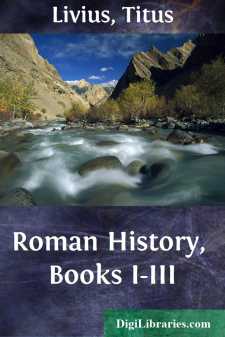Categories
- Antiques & Collectibles 13
- Architecture 36
- Art 48
- Bibles 22
- Biography & Autobiography 813
- Body, Mind & Spirit 142
- Business & Economics 28
- Children's Books 17
- Children's Fiction 14
- Computers 4
- Cooking 94
- Crafts & Hobbies 4
- Drama 346
- Education 46
- Family & Relationships 57
- Fiction 11829
- Games 19
- Gardening 17
- Health & Fitness 34
- History 1377
- House & Home 1
- Humor 147
- Juvenile Fiction 1873
- Juvenile Nonfiction 202
- Language Arts & Disciplines 88
- Law 16
- Literary Collections 686
- Literary Criticism 179
- Mathematics 13
- Medical 41
- Music 40
- Nature 179
- Non-Classifiable 1768
- Performing Arts 7
- Periodicals 1453
- Philosophy 64
- Photography 2
- Poetry 896
- Political Science 203
- Psychology 42
- Reference 154
- Religion 513
- Science 126
- Self-Help 84
- Social Science 81
- Sports & Recreation 34
- Study Aids 3
- Technology & Engineering 59
- Transportation 23
- Travel 463
- True Crime 29
Roman History, Books I-III
by: Titus Livius
Description:
Excerpt
LIVY'S ROMAN HISTORY
BOOK I[1]
THE PERIOD OF THE KINGS
To begin with, it is generally admitted that, after the taking of Troy, while all the other Trojans were treated with severity, in the case of two, Æneas and Antenor, the Greeks forbore to exercise the full rights of war, both on account of an ancient tie of hospitality, and because they had persistently recommended peace and the restoration of Helen: and then Antenor, after various vicissitudes, reached the inmost bay of the Adriatic Sea, accompanied by a body of the Eneti, who had been driven from Paphlagonia by civil disturbance, and were in search both of a place of settlement and a leader, their chief Pylæmenes having perished at Troy; and that the Eneti and Trojans, having driven out the Euganei, who dwelt between the sea and the Alps, occupied these districts. In fact, the place where they first landed is called Troy, and from this it is named the Trojan canton. The nation as a whole is called Veneti. It is also agreed that Æneas, an exile from home owing to a like misfortune, but conducted by the fates to the founding of a greater empire, came first to Macedonia, that he was then driven ashore at Sicily in his quest for a settlement, and sailing thence directed his course to the territory of Laurentum. This spot also bears the name of Troy. When the Trojans, having disembarked there, were driving off booty from the country, as was only natural, seeing that they had nothing left but their arms and ships after their almost boundless wandering, Latinus the king and the Aborigines, who then occupied these districts, assembled in arms from the city and country to repel the violence of the new-comers. In regard to what followed there is a twofold tradition. Some say that Latinus, having been defeated in battle, first made peace and then concluded an alliance with Æneas; others, that when the armies had taken up their position in order of battle, before the trumpets sounded, Latinus advanced to the front, and invited the leader of the strangers to a conference. He then inquired what manner of men they were, whence they had come, for what reasons they had left their home, and in quest of what they had landed on Laurentine territory. After he heard that the host were Trojans, their chief Æneas, the son of Anchises and Venus, and that, exiled from home, their country having been destroyed by fire, they were seeking a settlement and a site for building a city, struck with admiration both at the noble character of the nation and the hero, and at their spirit, ready alike for peace or war, he ratified the pledge of future friendship by clasping hands. Thereupon a treaty was concluded between the chiefs, and mutual greetings passed between the armies: Æneas was hospitably entertained at the house of Latinus; there Latinus, in the presence of his household gods, cemented the public league by a family one, by giving Æneas his daughter in marriage. This event fully confirmed the Trojans in the hope of at length terminating their wanderings by a lasting and permanent settlement....













